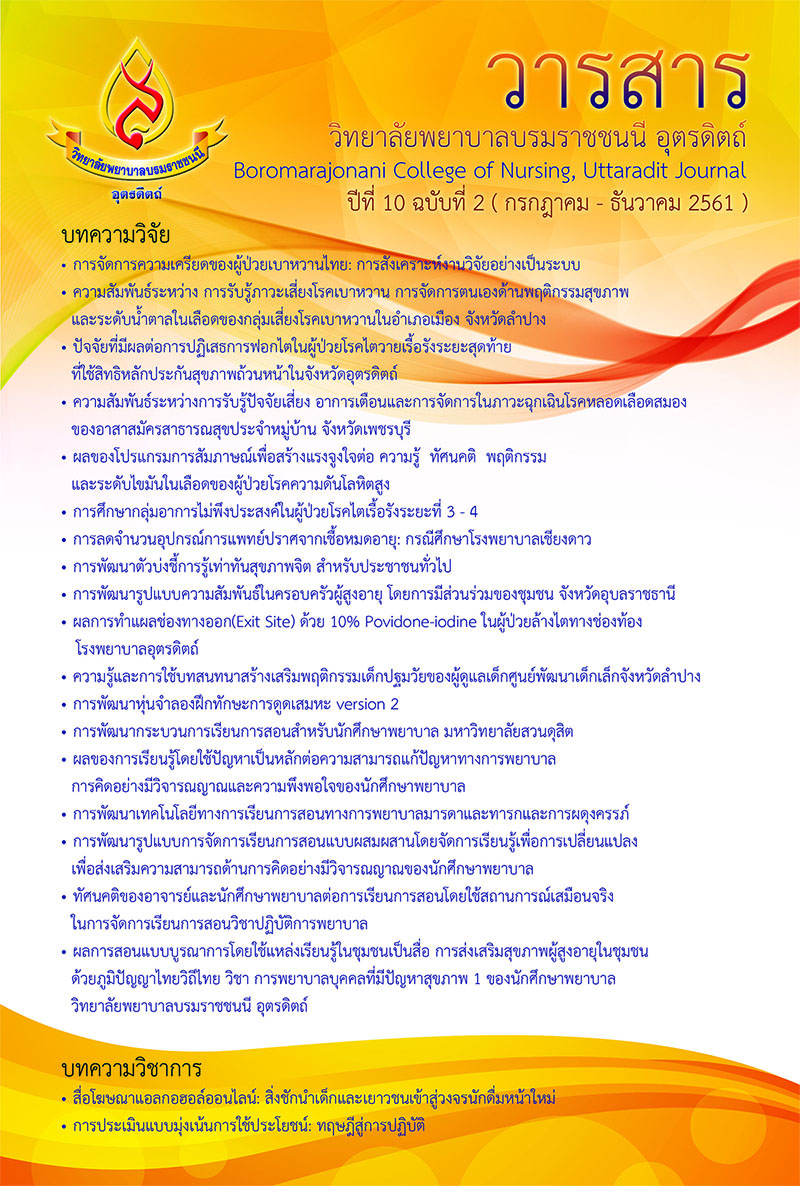การจัดการความเครียดของผู้ป่วยเบาหวานไทย: การสังเคราะห์งานวิจัยอย่างเป็นระบบ
Main Article Content
บทคัดย่อ
เบาหวานเป็นปัญหาสาธารณสุขที่สำคัญในประเทศไทย การทบทวนงานวิจัยอย่างเป็นระบบในครั้งนี้มีวัตถุประสงค์เพื่อสรุปแนวทางการจัดการความเครียดของผู้ป่วยเบาหวานไทย งานวิจัยที่ตีพิมพ์ในประเทศไทย จากฐานข้อมูลอิเล็คโทรนิกส์ ได้แก่ ThaiLis, ThaiJo และ Google scholar ตั้งแต่ปี พ.ศ.2549-2559 ได้ถูกรวบรวมขึ้น มีงานวิจัยที่ผ่านเกณฑ์การประเมินจำนวน 11 เรื่อง งานวิจัยทั้งหมดเป็นการวิจัยกึ่งทดลอง ผลการศึกษาพบว่า แนวทางการจัดการความเครียดเพื่อลดความเครียดและลดระดับน้ำตาลในเลือดของผู้ป่วยเบาหวานไทย สามารถสรุปได้ 3 รูปแบบ คือ 1) การกำกับตนเอง 2) การมีส่วนร่วมและแรงสนับสนุนทางสังคม และ 3) กระบวนการกลุ่ม โดยทั้งสามแนวทางสามารถช่วยลดความเครียดและลดระดับน้ำตาลในเลือดของผู้ป่วยเบาหวานได้ ดังนั้นผู้เขียนมีข้อเสนอแนะว่าเพื่อให้ผู้ป่วยเบาหวานลดความเครียดและลดระดับน้ำตาลในเลือดได้สำเร็จ นอกจากการให้ความสำคัญกับผู้ป่วยแล้ว บุคลากรสาธารณสุขควรคำนึงถึงสมาชิกสมาชิกในครอบครัวและคนในชุมชน
Article Details
บทความหรือข้อคิดเห็นใดใดที่ปรากฏในวารสารวิจัยการพยาบาลและวิทยาศาสตร์สุขภาพ เป็นวรรณกรรมของผู้เขียน ซึ่งบรรณาธิการหรือสมาคมศิษย์เก่า ไม่จำเป็นต้องเห็นด้วย และบทความที่ได้รับการตีพิมพ์เผยแพร่ถือเป็นลิขสิทธิ์ของวารสารวิจัยการพยาบาลและวิทยาศาสตร์สุขภาพ
เอกสารอ้างอิง
1. Angboonta, P., Pothiban, L., & Kosachunhanun, N. (2012). Effects of self-management
supporting program on self-management behaviors and hemoglobin A1c level among elders with diabetes type 2. Nursing Journal, 39(3), 93-104. (in Thai)
2. Boonprasarn, P., Tamdee, D., halardthunyakij, A., Hirunsupachote, U., & Seetoop, S. (2014). Effects of behavioral modification using cognitive theory on blood sugar control among diabetic patients, Huai Khot Hospital, Uthai Thani province. Nursing Journal, 41(suppl), 35-47. (in Thai)
3. Christensen, B. L. & Kockrow, E. O. (2011). Adult Health Nursing. (6th ed.). St. Louis: Mosby.
4. Chunhasawaddekul, T. (2006). Natural therapy for diabetes. Retrieved from https://www.thaicam.go.th/index.php?view=article&catid=63:2009-09-09-09-49-54&id
5. Clabburn, A. (2014). Theories for Mental Health Nursing. Los Angeles: SAGE.
6. Deesiang, W. (2006). Effects of self-management program on hemoglobin A1c and LDL-cholesterol level of type 2 diabetic patients. Thesis for Master degree of Nursing, Chulalongkorn University. (in Thai)
7. Diabetes Association of Thailand under the Patronage of Her Royal Highness Princess Maha Chakri Sirindhorn. Statistics of Diabetes Around the World. Retrieved from https://www.dmthai.org/statistic/1558 (in Thai)
8. Eliopoulos, C. (2010). Gerontological Nursing. (7thed.). Philadelphia: Lippincott Williams & Wilkins.
9. Hunthayung, D., Waengnork, W., & Kriengkaisakda, W. (2016). The effect of an applied Health Belief Model program on self-care behaviors of diabetic patients in Meung-Pai sub-district health promotion hospital zone. Phranakhon Rajabhat Research Journal, 11(1), 36-51. (in Thai)
10. Jadad, A. R., Moore, R. A., Carroll, D., & et al. (1996). Assessing the quality of reports of randomized clinical trials: Is blinding necessary? Control Clinical Trials, 17, 1–12.
11. Jiamjarusrangsee, W. (2017). Type 2 Diabetes: Epidemiology Prevention and Self-Management Support. Bangkok: Text and Journal Publication. [in Thai].
12. Jungsaman, S. (2014). Guidelines for Integrated Care and Cure of Patients with Type 2 Diabetes. Bangkok: Kanpimdotcom. (in Thai)
13. Kittipeerachon, P., Asawachaisuwikrom, W., & Janprasert, S. (2013). Effects of self-regulation program on arm swing exercise behavior and blood sugar of diabetic patients in community. Journal of Faculty of Nursing Burapa University, 20(4), 22-32. (in Thai)
14. Morrison-Valfre, M. (2017). Foundations of Mental Health Care. St. Louis: Mosby.
15. Nitiyanan, W. (2016). Thai people got diabetes. Retrieved from https://www.hfocus.org/content/2016/11/12992 (in Thai)
16. Pahira, W. (2007). The Effect of Qigong exercise on physical fitness, blood sugar and lipid levels of patients with type 2 diabetes mellitus in Maharaj Nakhon Ratchasima Hospital. Thesis for Master degree of Education, Nakhon Ratchasima Rajabhat University. (in Thai)
17. Pengyod, S. (2006). Effect of mental health promoting intervention for stress management in diabetes patient group, Phaisalee Hospital. Master degree for public health, Nakhon Sawan Rajabhat University. (in Thai)
18. Phetban, M., Khatti, B., & Phuangnak, P. (2014). The project evaluation of promoting of the community participation in reduces risk of diabetes and hypertension in Nam Pad district, Uttaradit, fiscal year 2012. Boromarajonani College of Nursing, Uttaradit Journal, 6(2), 46-59. (in Thai)
19. Praboromarajchanok Institute for Health Workforce Development. (2009). Nighty years of Thai Public Health for Healthy Thai People. Bangkok: The War Veterans Organization of Thailand Publication. (in Thai)
20. Priwansathaporn, N. (2011). Effects of health promotion program with Thai Qigong movement meditation on stress and blood sugar levels of type 2 diabetes patients attending at Prapokklao Hospital, Chantaburi. Thesis for master degree of public health, Burapa University. (in Thai)
21. Ratchawat, R. (2007). Effects of Health promoting program with yoga on stress and blood sugar level among type 2 diabetes patients. Thesis for Master dgree of Nursing, Burapa University. (in Thai)
22. Rasorn, A. (2013). Effects of application of sensory meditation exercise on stress reduction and self –care among type 2 diabetic patients in Kudchum district, Yasothon province. Research and Development Health System Journal, 6(2): 172-182. [in Thai].
23. Rujiwich, M. (2013). Stress Management Technique for improving Mental Health and Application. Bangkok: Thammasart Univerity Publication. (in Thai)
24. Sangkapong, T. & Wiangkham, C. (2012). Nursing Care for Diabetic Patients. Bangkok: N.P. press. (in Thai)
25. Sanit, A., Pichainarong, N., & Ratanasang, P. (2013). Effect of self- care and social support on stress reduction in type 2 diabetes patients, Sukasam sub-district health promotion hospital, Kut Chum District, Yasothon Province. Research and Development Health System Journal, 6(2), 190-196. (in Thai)
26. Sanchai, A., Pothiban, L., & Nanasilp, P. (2011). Effect of Thai Qigong meditation exercise on hemoglobin A1c level of the elderly type 2 diabetes mellitus. Nursing Journal, 38(4), 65-80. (in Thai)
27. Sikaw, A. (2015). Diabetes Management: Disease and Role of Nurses. Bangkok: M & M Laser Print. (in Thai)
28. Swademongkon, S. (2016). The 2015 Annual Report Bureau of Non-Communicable Diseases Department of Disease Control. Bangkok: The War Veterans Organization of Thailand Publication. (in Thai)
29. Sommung, P., Tansakul, S., Therawiwat, M., & Kengganpanich, T. (2015). The effects of a bless program for exercise behavior among type 2 diabetes patients. The 17th National Health Education Conference “Role of People on Health Behavior Change. 14-16 May 2015, Pattaya, Chonburi. (in Thai)
30. Sriprom, C. (2007). Self-care behaviors of patient with diabetes in community hospitals, Ubon Ratchathani. Thesis for Master degree of Public Health, Nakhon Ratchasima Rajabhat University. (in Thai)
31. Tatamnuk, B. (2010). The effects of group counseling on decrease stress of diabetic mellitus patients in Chondan Hospital, Phetchabun province. Independent study for master degree in education, Naresuan University. (in Thai)
32. Thongkhum, K., Ruchiwit, M., & Somprasert, C. (2015). The effect of meditation training together with a biofeedback training program on the stress levels of chronic disease patients. Nursing Journal, 42(1), 24-37. (in Thai)
33. Treeyawarangpunt, K. (2016). Enhancing psychological immunity of families to elderly with chronic conditions. Boromarajonani College of Nursing, Uttaradit Journal, 8(2), 1-19. (in Thai)


